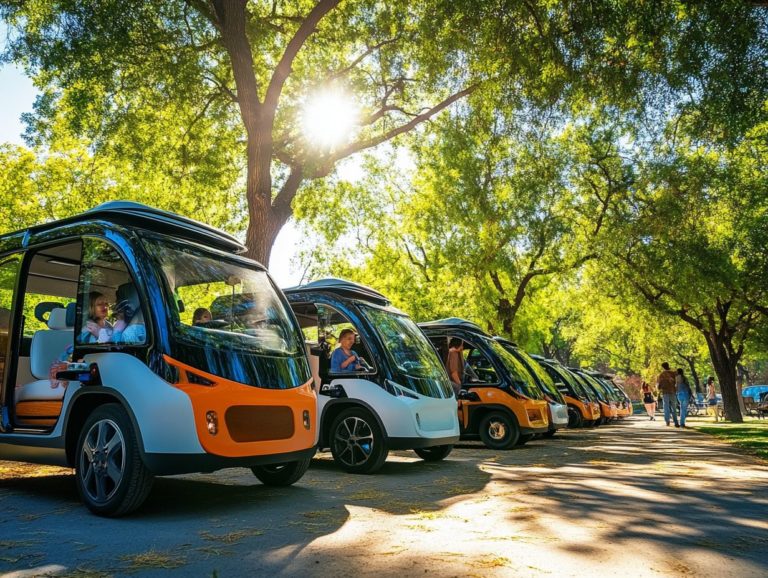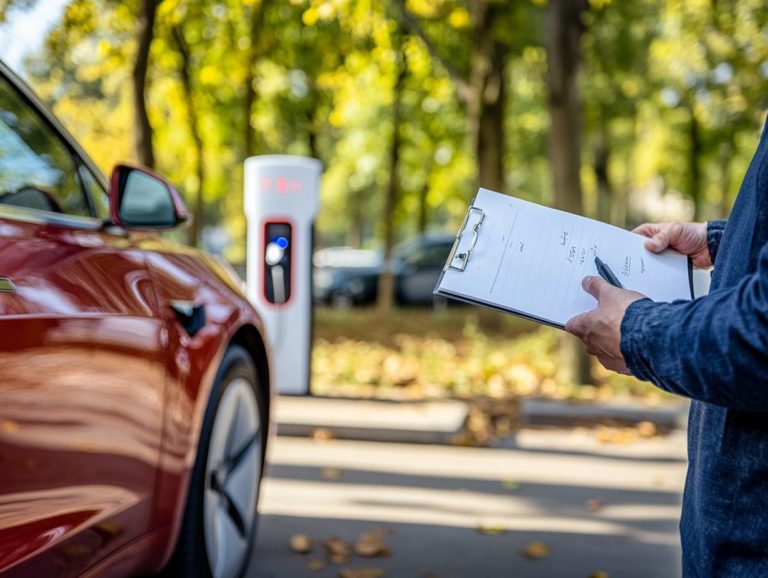How to Evaluate EV Range Before Buying
As electric vehicles (EVs) gain momentum in today s market, grasping their range becomes essential for you as a prospective buyer.
This article delves into the concept of EV range and examines the many factors that influence it, from battery capacity to your unique driving habits. It offers valuable insights on how to assess range claims from manufacturers and effectively compare different models.
You ll also find practical tips for maximizing your EV’s range, along with solutions to common concerns like range anxiety. This ensures you embark on your electric journey fully prepared.
Contents
Key Takeaways:
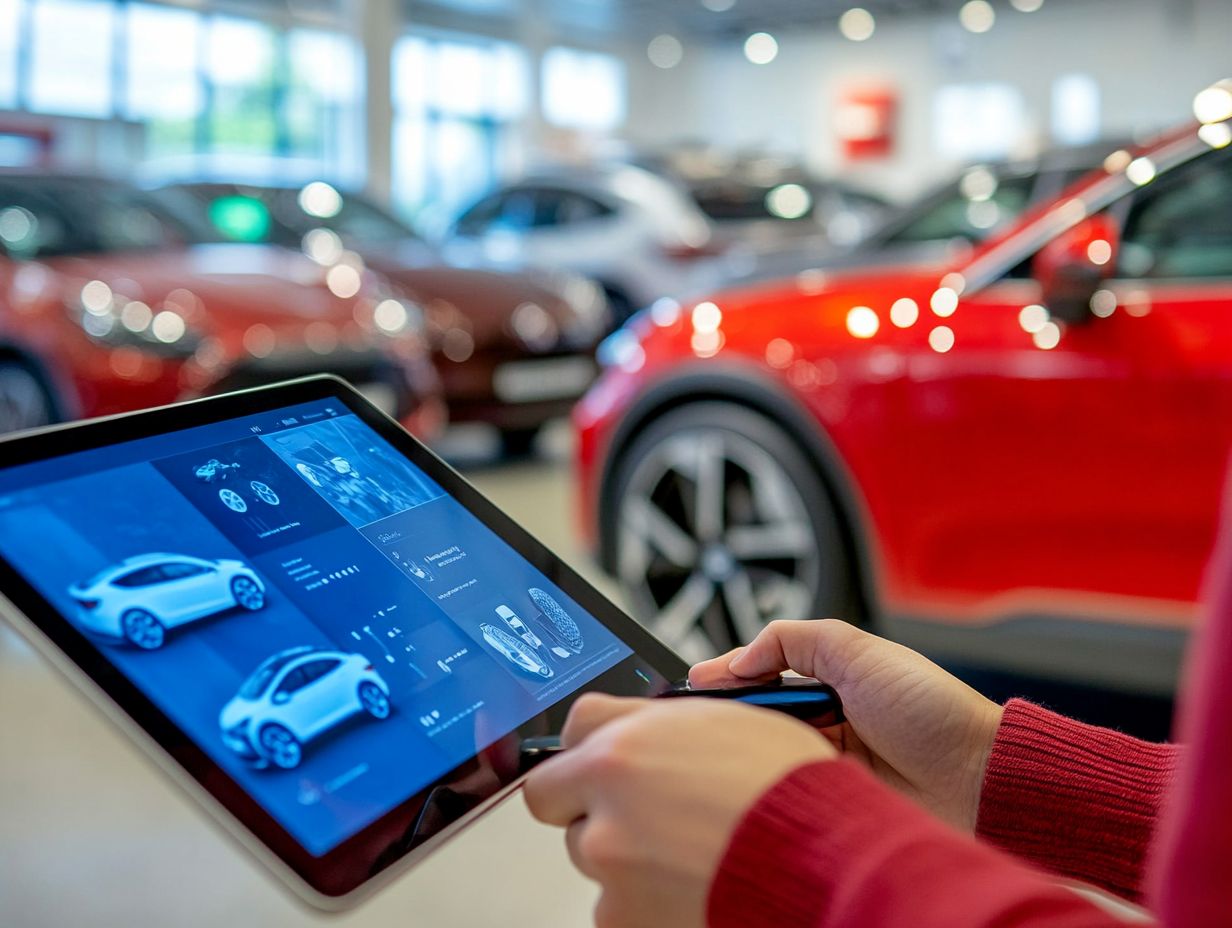
- Research the manufacturer’s claims and read reviews to understand an EV’s range.
- Consider your driving habits and conditions to determine if an EV’s range will meet your needs.
- Maximize your EV’s range by following tips for extending battery life and using efficient driving techniques.
What You Need to Know About EV Range
EV range shows how far you can go on a single charge an essential factor in your driving experience! It is affected by various factors, including battery capacity, driving conditions, and vehicle performance.
As a prospective EV driver, it s vital for you to understand how these elements interact to alleviate range anxiety and maximize the convenience of electric driving. With advancements in smart charging technologies and improvements in mileage ratings, the future of electric vehicles looks promising, aligning with climate goals and legislative initiatives aimed at facilitating an energy transition.
What is EV Range?
EV range represents the distance you can travel in an electric vehicle on a single charge. This distance is typically measured in miles per charge and can vary widely depending on several factors, such as the vehicle’s weight, aerodynamics, and the efficiency of its electric drivetrain.
Your driving conditions also play a significant role; for example, highway driving tends to allow for longer ranges compared to urban stop-and-go traffic. Cold weather can negatively affect battery efficiency, limiting how far you can go on a single charge.
Understanding these intricacies is essential for electric vehicle owners like you, enabling effective journey planning and maximizing your driving experience.
Factors Affecting EV Range
Several factors significantly influence the range of electric vehicles. Battery capacity, energy consumption, and driving conditions all play a crucial role in determining how far your EV can travel before it requires a charge.
Understanding these elements can help you make informed decisions about your electric vehicle experience.
Battery Capacity and Efficiency
Battery capacity plays a pivotal role in the overall efficiency of electric vehicles, determining the total energy available for powering your journey, typically measured in kilowatt-hours (kWh). This capacity significantly impacts how far you can travel on a single charge, making it crucial not just for your daily commutes but also for those longer adventures.
In the electric vehicle landscape, lithium-ion batteries reign supreme, favored for their high energy density and superior longevity compared to other options.
The kWh per mile metric comes into play as an invaluable tool for you, allowing you to evaluate energy consumption effectively. By understanding how much energy is consumed for each mile traveled, you can make informed decisions about when to charge and how to plan your trips.
Ready to explore the world of electric vehicles? Dive into your options today!
Driving Habits and Conditions

Driving habits and environmental conditions significantly influence the effective range of electric vehicles, shaping how far you can travel on a full charge.
Understanding the nuances between aggressive and conservative driving styles is crucial for maximizing performance and minimizing energy consumption. Typically, an aggressive driver accelerates rapidly and brakes hard, which can drain an EV’s battery much faster than a smoother, more conservative approach. In fact, research suggests that adjusting your driving behavior can enhance your range by up to 20%.
Weather conditions also play a vital role in an electric vehicle’s efficiency. In cold weather, studies indicate that an EV can lose as much as 40% of its stated range due to increased energy demands for heating and diminished battery efficiency. While warm weather usually favors range, it can still lead to higher energy consumption for cooling systems. This underscores the importance of both driving style and environmental settings in determining overall performance.
How to Evaluate EV Range Before Buying
Evaluating the EV range before making a purchase is crucial to ensure that the electric vehicle aligns with your driving requirements. Additionally, understanding how to evaluate EV resale value can help in making an informed decision by considering factors like manufacturer claims, EPA ratings, and user reviews.
Researching Manufacturer’s Claims
Researching manufacturers’ claims about EV range is essential for you as a potential buyer to grasp the true battery capacity and mileage rating of electric vehicles, including understanding EV range anxiety.
By taking a closer look at these specifications, you can better assess the reliability of a vehicle’s performance in your daily life. It’s vital to compare the figures provided with real-world tests and reviews from trusted sources, as advertised metrics often offer an overly rosy view.
Seek out independent reviews and comparisons that detail actual range results under various conditions. Stay alert for discrepancies between what the manufacturer promotes and what reliable automotive journalists or fellow owners report. For further guidance, learn how to optimize your EV’s range. These insights can unveil critical differences in battery life and overall efficiency, ensuring that you make an informed decision.
Reading Reviews and Comparing Models
Reading reviews and comparing various electric car models can offer you invaluable insights into their performance and real-world EV range. To enhance your understanding, consider learning how to read EV reviews and ratings, giving you the power to make informed decisions.
To truly grasp the nuances of different models, it s crucial to consider both expert analyses and consumer feedback. Experts tend to dive into specific metrics like acceleration, handling, and the complexities of battery management (the system that controls how the battery charges and discharges), while everyday users provide insights into their real-world experiences and satisfaction levels.
Make sure to focus on details regarding charging times and mileage ratings across different vehicles, as these factors can significantly impact the practicality of your purchase. By synthesizing the information from both experts and consumers, you ll be in a much better position to evaluate how a particular car aligns with your lifestyle and needs.
Maximizing EV Range
Maximize your EV range today! Embrace strategies that extend battery life and elevate your overall driving experience. Each approach not only enhances efficiency but also transforms the way you interact with your electric vehicle.
Tips for Extending Battery Life
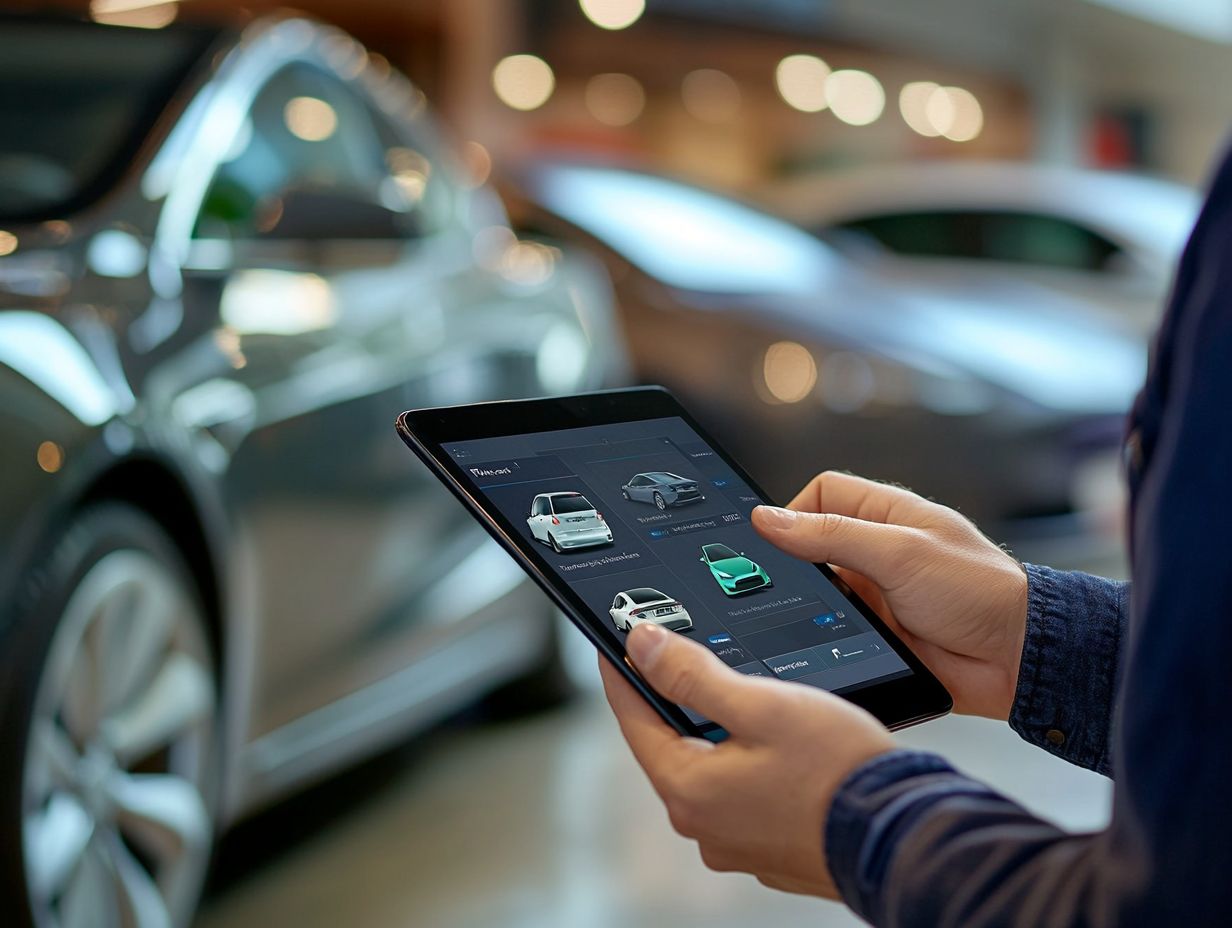
Extending the battery life of your electric vehicle is crucial for maximizing range. It ensures you enjoy your driving experience to the fullest.
Charge your battery to about 80% for daily use. This prevents strain on the battery over time.
Regularly inspect your charging cables and connections to maintain optimal performance. Avoiding extreme temperatures also helps protect the battery s integrity.
Adjusting your driving habits can further boost efficiency. Practice gentle acceleration and take advantage of regenerative braking, a feature that helps recover energy when you slow down.
A good network of charging stations is vital. It provides the support you need to charge your vehicle easily while on the go.
Efficient Driving Techniques
Employing efficient driving techniques can significantly enhance your electric vehicle s performance and energy consumption.
By embracing smoother acceleration, you can reduce energy consumption effectively. Additionally, practicing regenerative braking can convert energy lost during deceleration back into usable power.
Be mindful of your driving habits, like maintaining a steady speed and minimizing rapid lane changes. This can lead to a tangible improvement in battery longevity and overall efficiency.
Collectively, these techniques extend the distance your electric vehicle can travel between charges and promote a sustainable approach to personal transportation.
Considering Range Anxiety
Range anxiety is a common concern for those considering electric vehicle ownership. However, exploring potential solutions, such as how to evaluate sustainable practices in EVs, can ease your worries and enhance your experience.
Addressing Concerns and Potential Solutions
Addressing concerns about range anxiety starts with understanding the solutions available to electric vehicle drivers today.
Utilizing a network of charging stations at convenience stores and public spaces allows you to easily find places to recharge your vehicle during long trips.
These strategically placed chargers ease your concerns about running low on battery. Recent advancements in battery technology, including increased capacity and faster charging times, also alleviate these worries.
Additionally, vehicle-to-grid capabilities enable you to engage with energy markets, effectively transforming your vehicle into an extra power source. This boosts the confidence of both current and prospective electric vehicle enthusiasts.
Frequently Asked Questions
What is EV range?
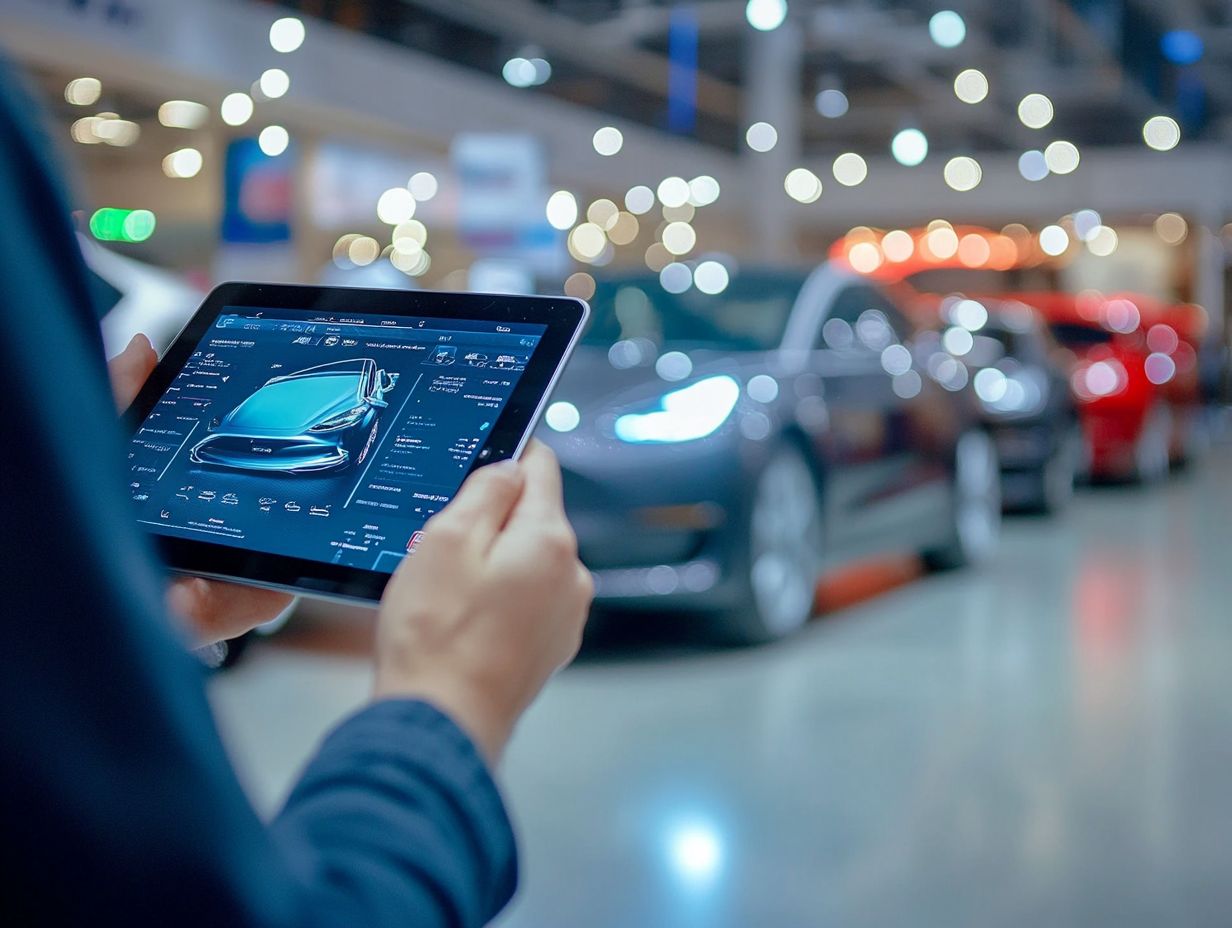
EV range refers to the distance an electric vehicle can travel on a single charge. It determines how far you can drive before needing to recharge, impacting your overall driving experience.
How do I find out the EV range of a vehicle?
You can determine the EV range by checking the manufacturer’s specifications and reviews from reputable sources. Additionally, what you should know about EV driving range can also enhance your understanding, and test driving the vehicle gives you an idea of its range in real-life conditions.
What affects EV range?
Factors such as weather, driving style, and terrain can affect EV range. To make an informed decision, consider your typical driving habits and the climate of your area by reading this guide on how to find the right EV for your commute to choose an electric vehicle with a suitable range for your needs.
Ready to embrace electric driving? Start planning your trip today!
Are there any tips for maximizing EV range?
Yes, there are several tips to help you maximize your EV range. Use eco mode and drive at a steady speed.
Avoid quick accelerations and heavy braking. Keep your tires properly inflated for the best performance.
Warming up the vehicle’s interior while it s still plugged in can also help save energy.
Is it better to have a longer EV range or a shorter one with a fast-charging option?
This depends on your personal needs. A longer EV range offers more convenience and fewer charging stops.
On the other hand, a shorter range with fast-charging options allows for quick battery top-ups on longer trips.
Consider your typical driving patterns to determine what works best for you.
How can I compare EV range among different electric vehicles?
The easiest way to compare EV range is to look at the range estimated by the Environmental Protection Agency (EPA). Additionally, you can refer to how to prepare for your first EV purchase by checking real-life tests and reviews from trusted sources, and take your own test drives for a better understanding of each vehicle’s range.



